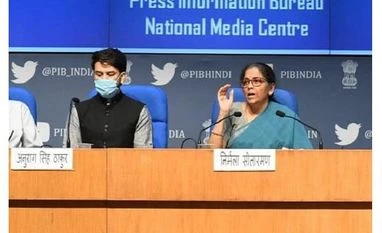She said that reforms in the seven sectors will be the focus of the fifth and final tranche of economic stimulus package to deal with the economic fallout of the pandemic. "Package would focus on MGNREGA, healthcare and education, businesses, de-criminalisation of the Companies Act, ease of doing business, public sector undertakings, and resources related to state government," she pointed out.
New policies related to public sector undertakings (PSUs) would be announced soon to ensure those in strategic sectors would remain present, and the rest would either be privatised or merged, Sitharaman said.
"A new 'coherent' public sector enterprises policy will be formulated that will define strategic sectors which will have not more than four PSUs. List of strategic sectors requiring presence of PSUs in public interest will be notified. In strategic sectors, at least one enterprise will remain in the public sector but private sector will also be allowed," she said.
In other sectors, PSUs will be privatised. "To minise wasteful administrative costs, number of enterprises in strategic sectors will ordinarily be only one to four; others will be privatised/merged/brought under holding companies," she said.
She also announced decriminalisation of the Companies Act in violations involving minor technical and procedural defaults including shortcoming in CSR reporting, inadequacies in board report, filing defaults and delay in holding AGM.
Majority of the compoundable offences sections will be shifted to internal adjudication mechanism (IAM), she said adding that amendments will be brought through an Ordinance and will de-clog the criminal courts and NCLT.
Seven compoundable offences under the Companies Act altogether dropped and five to be dealt with under alternative framework, the finance minister said.
To read the full story, Subscribe Now at just Rs 249 a month
Already a subscriber? Log in
Subscribe To BS Premium
₹249
Renews automatically
₹1699₹1999
Opt for auto renewal and save Rs. 300 Renews automatically
₹1999
What you get on BS Premium?
-
Unlock 30+ premium stories daily hand-picked by our editors, across devices on browser and app.
-
Pick your favourite companies, get a daily email with all news updates on them.
Full access to our intuitive epaper - clip, save, share articles from any device; newspaper archives from 2006.
Preferential invites to Business Standard events.
Curated newsletters on markets, personal finance, policy & politics, start-ups, technology, and more.
Need More Information - write to us at assist@bsmail.in



)